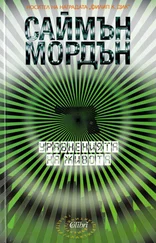Young Krenz took one side, his father the other, and together they peeled the outer covering off the dome. The internal former had fallen away. All that was left was a trick of the light, an optical illusion.
The material was crystal clear: only the lensing effect made its presence visible. Petrovitch walked forward, the fingers of one hand stretched out in front of him, stepping slowly until his fingertips brushed against a smooth, oily surface. He left smears that seemed to hang in mid-air.
“ Yobany stos. ”
He paced around it, watching the way the images of the Krenzes warped and shifted through the plastic shell, until he arrived back at the start.
“Is it what you wanted?” asked Young Krenz.
Petrovitch hesitated before answering. In a moment, he was old again, looking down on a shoreline that was pocked with domes, while above him in the blue sky, flecks of light were rising out of sight. He was dying, and he didn’t care.
“Yeah.” He didn’t need to imagine what it would look like scaled up. He’d already seen it. “Let’s deal.”
He offered them straight cash, in return for a licensing deal, access to their plans and their suppliers. He offered them enough that Young Krenz assumed that his father was going to take it, but Older Krenz had other ideas.
“I would make you a hundred-meter dome. I would that you show me the way to make it. I believe that, yes, we make playhouses and greenhouses and swimming pool covers, but we can make them bigger? You show me how. You show me these coatings. We are family business: small and reliable, but not…”
“Imaginative,” interrupted Young Krenz. He looked rueful, as if he’d had this conversation a hundred times before.
“Yes, yes, that. You tell us how to build bigger, and we will do it for you.”
“I won’t be asking for just one dome. I’ll want several to start with, then more. I want to be able to do this myself. With help, sure, but something that a few people can put up in a day or so. Are you worried that I’m going to set up in competition against you?”
Krenz nodded.
“Herr Krenz, in two weeks’ time, I’m going to need somewhere else to live. When the Metrozone Authority takes over, it’ll be a matter of hours before I’m dragged in front of a judge on one extradition warrant or another. I’m not interested in Petrovitch Industries, I’m interested in my own survival. So, how about this? I will give you everything I can think of. Every last technical detail of every innovation I can come up with. In return, you do the same for me. Everything. No hiding anything to get a commercial advantage, because there won’t be any. You’ll be the only one selling Krenz domes. Think you can do that?”
“A… what is the word?”
“Partnership. I think.”
The Krenzes looked at each other across the quayside, and at the smaller figure standing between them.
“Okay. Where do you want the first one built?”
Petrovitch started to laugh, and he laughed so hard that his lungs ached. “That, gentlemen, I can’t tell you.”
“But…”
“Because I don’t exactly know.”
“You do not know?”
“Not yet.”
“How can we then go forward?”
Petrovitch dug his hands in his pockets. “Go home. Order formers for a hundred-meter dome. A dozen of them. Get all the stuff together that you’ll need—I’ll send instructions for the extra kit. Then you wait for my call. If it clicks past two weeks and I’m all over the news chained up in an orange jumpsuit, you’ll have to assume the deal’s off.”
“We will be rich, or bankrupt.” Young Krenz digested the news, and Older Krenz scratched at his head. “This is not a choice I wanted to have.”
“That’s fine. I’ll give you two million up front.” Petrovitch blinked. “Done. Don’t spend it all at once.”
He started to walk back toward where the new skyscrapers were taking shape, where the cranes were tallest and the sounds of construction the loudest, when Young Krenz called after him.
“Do you want nothing in writing? A signed agreement? Something? Anything?”
Petrovitch twisted around and walked backward, unerringly navigating any of the obstacles in his path. Just because he couldn’t see them didn’t mean he wasn’t looking. He considered telling the Krenzes that he’d recorded everything that had gone on: every word, every gesture, every detail of the equipment and the chemicals they’d used. He decided that would weird them out completely, and he needed them.
“I have your word. Do I need anything more?”
“I suppose not. This is most irregular, though.”
“CNN called me an international criminal mastermind this morning. The Jyllands-Posten only has me down as the most dangerous man alive, which is slightly better, but not much. Yeah, of course I’ll sign something if you want. Or we can keep this below the radar for as long as we can. Your call.”
“We will do as you say, then. Two weeks? That does not give us much time.”
“You and me both, Herr Krenz.” Petrovitch took one last look at the dome, glittering in the low winter sun. The surface was cooling, and attracting moisture. If that was the case, he could have dew traps all around the base…
Then he turned again. He went back on the ’net, searching for anything of significance, while he let client software take over his walking.
It seemed like the whole world was intent on tearing itself apart, and he was setting himself up as the only one who could mend it again. Stupid, stupid, hubristic delusions. And yet he’d contacted a couple of obscure German engineers in their quiet Bavarian town, and they’d come of their own free will. No one had put a gun to their heads: a tactic Petrovitch was so used to, he’d grown sick of it.
His phone—the virtual one in his head—rang. He absently picked up the call before he’d checked the number, before he’d run it though a search program to tell him where the dialer was and who they were. He was distracted. A mistake, and he didn’t often make that sort of error.
“Yeah?”
“Is that Samuil Petrovitch?”
The voice was American. The face attached to the voice tickled a memory buried deep inside his mind: it was clean-cut, well-fed, healthy. That was now, but back then he’d been bruised, ragged, terrified and desperate.
“Just to get this straight: your name didn’t used to be Petrovitch when you lived in St. Petersburg four, five years ago. You worked for a man called Boris. He kidnapped me…”
“ Chyort. Dalton.”
“Isuppose this conversation was inevitable, but I’m pretty certain that when we went our separate ways, we had an unspoken agreement that we’d never talk to each other ever again.” Even though Petrovitch was transmitting voice-only, there was no point in denying who he was.
“That,” said Dalton, “had always been my intention, too. Forget St. Petersburg, forget Boris, forget you. Then suddenly a year ago, you became public enemy number one. It was kind of hard to ignore you. Walmart were selling caricature masks of you for Halloween.”
“Yeah, well. What happens in St. Petersburg, stays in St. Petersburg.” Petrovitch took a long look at Dalton, the office behind him, and the view from the window in what must have been an achingly tall tower of glass and steel. “You seem to have bounced back.”
“What do I call you?”
“A lot of people ask me that. I tell them the same thing: Petrovitch.”
“Doctor Petrovitch?”
“If they’re being kind. You were always Dalton when I remembered you. Just call me Petrovitch and have done with it. Speaking of which, you shouldn’t really be calling me anything. I’m the Antichrist, the devil incarnate and the villain in a thousand badly written and factually incorrect stories. You could be arrested for even talking to me.”
Читать дальше

![Саймон Морден - Билет в никуда [litres]](/books/388091/sajmon-morden-bilet-v-nikuda-litres-thumb.webp)
![Саймон Морден - Билет в один конец [litres]](/books/395533/sajmon-morden-bilet-v-odin-konec-litres-thumb.webp)









